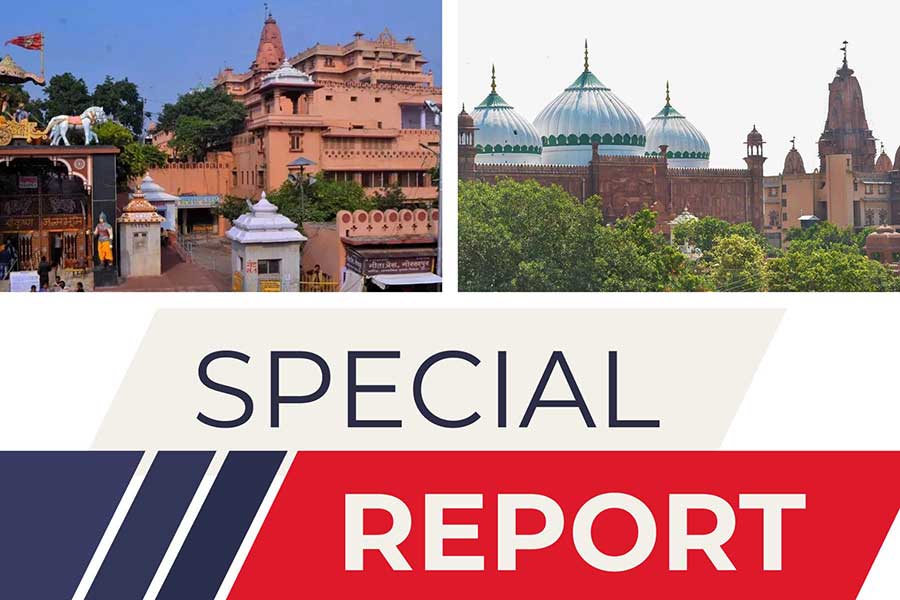Krishna Janmabhoomi Case: Supreme Court Halts High Court’s Move to Appoint Commissioner for Shahi Eidgah Mosque Inspection
In a recent development concerning the Krishna Janmabhoomi-Shahi Idgah Masjid dispute, the Supreme Court has intervened by staying the Allahabad High Court’s order to appoint a court commissioner to inspect the Shahi-Idgah mosque premises.
Krishna Janmabhoomi Case Supreme Court Vs High Court Highlights
- Supreme Court stays Allahabad High Court’s order to appoint a court commissioner for Shahi-Idgah mosque inspection.
- Justices Sanjiv Khanna and Dipankar Datta allow High Court proceedings but halt commission execution until the next Supreme Court hearing.
- Supreme Court expresses dissatisfaction with vague application, stressing the need for specificity. Justice Khanna criticizes the omnibus nature of the prayer for a commissioner.
- High Court previously granted permission for a local commissioner based on an application from Hindu parties.
- Ongoing original suit claims the Mathura Shahi Idgah Masjid was constructed on Krishna Janmabhoomi land.
- Civil suit seeks mosque removal, alleging construction on Krishna Janmabhoomi land, suggesting it might be a Hindu temple. The primary suit was initially dismissed in September 2020 and reinstated after an appeal in May 2022 by Mathura District Court.
- District court ruled the suit maintainable, overturning the previous dismissal.
Krishna Janmabhoomi Case News
Justices Sanjiv Khanna and Dipankar Datta, presiding over the case, directed that the proceedings before the High Court could continue, but the execution of the commission would be on hold until the next hearing in the top court.
The Supreme Court expressed dissatisfaction with the vague and omnibus nature of the application filed before the High Court, emphasizing the need for specificity. Justice Khanna observed, “The prayer (for commissioner), it is so vague! It has to be specific. This is wrong; you have to be very clear about what you want him for, and you leave it to the court. It is an omnibus application.”
Additionally, the apex court mentioned that the transfer of the case was under consideration, and various legal questions had arisen. The High Court had previously granted permission for the appointment of a local commissioner based on an application filed on behalf of a Hindu deity, Bhagwan Shri Krishna Virajman, and seven other Hindu parties on December 14 last year.
This application, part of an ongoing original suit before the High Court, claimed that the Mathura Shahi Idgah Masjid was constructed on Krishna Janmabhoomi land.
The civil suit, representing the Hindu deity and devotees, seeks the removal of the mosque, alleging its construction on Krishna Janmabhoomi land. The plaintiffs also argue that the Shahi-Idgah Mosque might actually be a Hindu temple, prompting the application for a commissioner to examine the site.
The primary suit, initially dismissed by a civil court in September 2020 under the Places of Worship (Special Provisions) Act, 1991, was reinstated after an appeal before the Mathura District Court.
In May 2022, the district court ruled that the suit was maintainable, overturning the previous dismissal. The case was subsequently transferred to the High Court in 2023, where it currently awaits resolution.
What is the Krishna Janmabhoomi-Shahi Idgah Masjid dispute?
The Krishna Janmabhoomi-Shahi Idgah Masjid dispute is a longstanding legal conflict centred around the site in Mathura.
The contention arises from the claim made by Hindu petitioners that the Shahi Idgah mosque, situated adjacent to the Krishna Janmabhoomi temple, bears indications suggesting its previous existence as a Hindu temple.
According to the Hindu side, the mosque was allegedly constructed on the sacred birthplace of Lord Krishna in Mathura, and they point to the presence of a lotus-shaped pillar on the mosque premises, a characteristic feature of Hindu temples.
A significant development occurred on December 14 of the preceding year when the Allahabad High Court granted permission to the Hindu petitioners to conduct a court-monitored survey of the Shahi-Eidgah mosque premises in connection with the Krishna Janmabhoomi case.
This order was issued in response to an application filed by a plaintiff seeking the restoration of the 13.37-acre land associated with the mosque.
It’s worth noting that the mosque committee contested this order and sought the dismissal of the Hindu side’s plea. Their argument was grounded in the Places of Worship (Special Provisions) Act, of 1991, which imposes restrictions on altering the character of religious places.
The mosque committee contends that the lawsuit is barred by this Act, raising a legal hurdle in the dispute. The complexity of the case lies in the intersection of historical and religious claims, with legal considerations further shaping the trajectory of the dispute.

